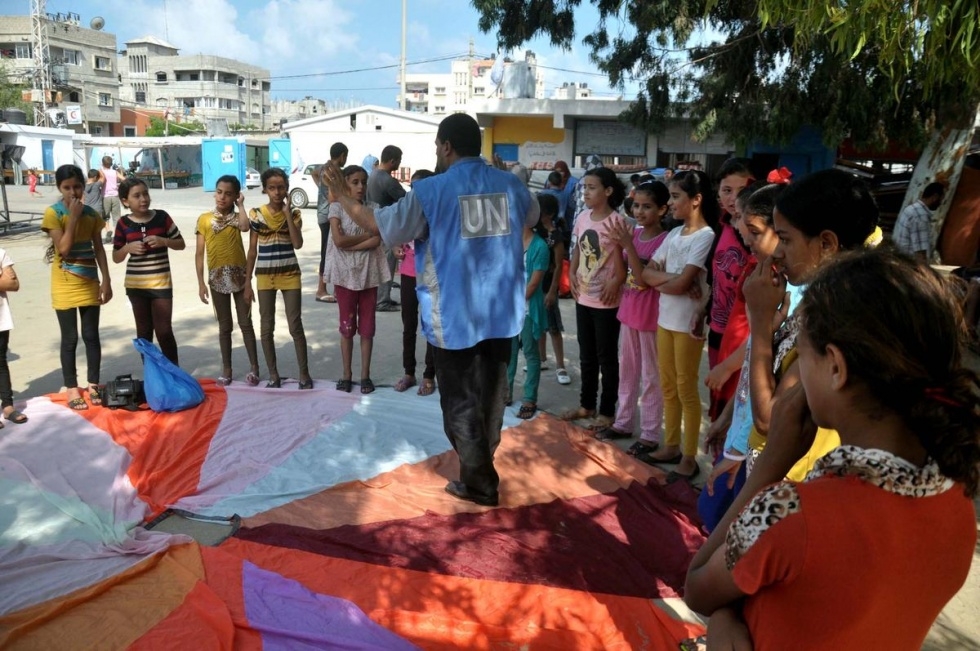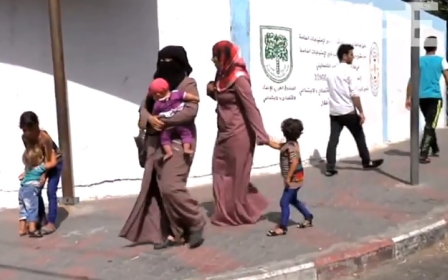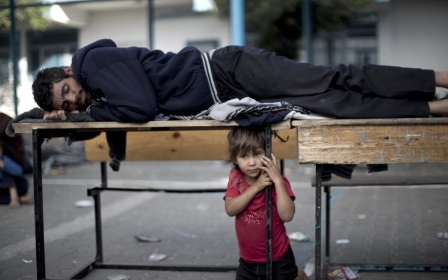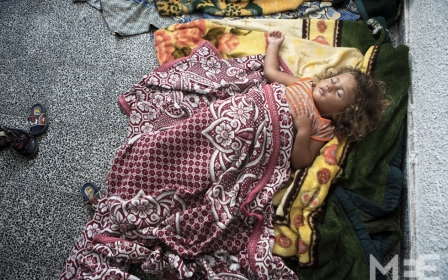War takes mental toll on Gaza’s children as school year begins

As the long awaited ceasefire finally comes into effect, Palestinians in Gaza begin the task of picking up the pieces of their lives, which have just endured 50 days of violence and bloodshed.
It is clear though, that the trauma created by Israel’s Operation Protective Edge has created not only human and material damage, but it went further, wreaking havoc on schoolchildren’s mental health.
As the 2014 school year begins, students will likely not be mentally prepared to focus on their studies; the mental toll has been massive. Local mental health workers are overwhelmed and stretched thin.
“All Gazans are affected; the most worrying cases of whom are parents,” Dr. Sami Owaida, a child psychiatrist of the Gaza Community Mental Health Program said.
“Parents are the immune system for children, the source of security and warmth for them which, if exhausted, children may live in a state of loss, denial, solitude, introversion, distress, and bad dreams,” he said.
Adding insult to injury, the latest Israeli offensive is the longest of the past three wars Gaza has endured in the past seven years, which heralds compounded cases of trauma among the entire population, particularly children.
After the November 2012 war, the United Nations agency for Palestinian refugees (UNRWA) said the psychological trauma and post-traumatic stress disorder in Gaza had doubled, noting that 42% of patients they treat are under the age of nine.
“Several children I had treated for previous post wars trauma are coming back to my clinic these days. Some have eating and sleeping disturbances, others started bedwetting,” said Dr Owaida.
In a recent statement, Chief of the UN Children's Fund (UNICEF), Pernilla Ironside, said that 373,000 Palestinian children need immediate psycho-social first aid as a result of the ongoing war on Gaza.
“There isn't a single family in Gaza who hasn't personally experienced death, injury, the loss of their home, extensive damage and displacement,” said Ironside, describing the emotional and psychological impact as “destabilising.”
Pointing to the difficulty in handling the huge number of the affected, the UNICEF official said that 50 psychologists and counsellors have reached out to 3,000 children directly impacted by loss, adding that “the needs are ‘staggering’ as parents are also in a state of trauma.”
Middle East Eye interviewed Dr. Iyad Zaqout, Manager of UNRWA’s Community Mental Health Programme, who said that his agency dispatched its school counsellors and offered many mental health organisations permits to provide emergency counselling and refreshment at the UN-run school shelters.
However, with the beginning of the 2014-2015 year, the agency could not cope without hiring a minimum of 300 new counselors and their supervisors - one tenth the number - to deal with the pupils in need of psychological support, according to Dr. Zaqout.
UNRWA’s psychotherapy work will not only target students, but it will also apply to their teachers to ensure their well-being.
“We will hold a four-day course for all instructors and counsellors to make sure that they are not charged, and to train them in ways to get the pupils to socialise and involved in school life,” Zaqout said.
UNRWA runs 245 schools with 232,384 pupils. 90 schools were opened as refuge centers for 292,489 displaced Gazans soon after Israel announced a ground invasion into the coastal territory.
The agency estimated that 109 installations have been damaged since the Israeli military campaign was put in motion on 8 July 2014, the majority being schools (79 out of 156 school buildings), including those serving as emergency shelters.
Mr. Mohamed Kafina, Head of Projects Unit at Palestine Trauma Center (PTC), reiterated the urgency of calm to enable children-focused psycho-social treatment.
“Our 25-member emergency staff, including psycho-social and clinical specialists, and psychiatrists, is still behind the diagnosis or ‘remedial intervention’ stage” he said.
The charitable, UK-based center provides services in prevention, counselling, rehabilitation, and therapy for Gazans since 2007.
At this time, the PTC is carrying out relief activities at UN-run school shelters - upon being authorised, where puppet shows, play contests, songs, and stories serve as first aid to the shocked children and tools of “containment.”
“We want to move their lives from depression to semi-normalcy and social engagement, in order that war-incurred disorders not deteriorate into a mental breakdown,” Kafina said.
The operations of the PTC will continue until the first week of the school year, then rapid intervention teams will operate at schools that were bombed by Israeli missiles.
“We expect many youngsters to be mentally ill or emotionally disturbed, likely showing aggressive, disobedient, nervous, or irritating behaviors,” he added.
As tens of schools have been fully or partially damaged by direct or indirect Israeli attacks, Kafina believes young students may now have developed negative perceptions about school-attendance.
“Needless to say, some already had a phobia about school, having witnessed classes scarred by the bombings,” he said.
Dr. Ziad Thabet, Assistant Deputy Minister of Education, told MEE that 141 schools have been damaged by the Israeli bombardment, 22 of which were irreparably destroyed, and 122 used as shelters, including 90 run by UNRWA.
Schools in Gaza were scheduled to open on Saturday, August 23, but have been delayed until further notice.
“The year’s start is bound by two factors: ending the aggression and readying the school buildings which sustained partial damage or those housing refugees,” Thabet said.
The official added: “It will take no less than two weeks to technically prepare the schools and the teachers, who are all to act as counsellors and refreshers during this period.”
“What we have been in is not easy at all,” Zaqout said, noting “Following the 2008 war, 10-15% of the UNRWA-registered students needed long-term mental intervention. Now we expect this number to rise, given the increase of refugees signing up with UNRWA.”
World Health Organisation (WHO) figures regarding the 22-day war on Gaza in 2008 (Operation Cast Lead) estimated that “between 70 percent and 75 percent of the population develop mild to moderate post-traumatic reactions after a large-scale crisis, such as the one in Gaza, while it estimates that 5 percent to 10 percent of people in Gaza may need professional mental health support to address more long-term problems, such as depression, trauma, anxiety and panic attacks.
The current deadly offensive is certainly aggravating Gaza’s fragile and modest mental health system. “We lack the specialists that fit the size of the crisis,” Kafina complained, saying the number of trauma-specialised centers working in the besieged Gaza Strip does not exceed three.
Just before the ceasfire began Owaida had issued this warning: “Unless the political crisis ends soon, children’s mental health will be no better, because the scenes of destruction and blood are everywhere, in the streets or on the TV".
“A human disaster is before us, there is no escape from it, but what we have to do to get out of the war with the lowest losses,” he said.
“The occupation wants us defeated, mind-crippled. But our people will not let him go. With our toughness, we will survive.” he stressed.
Stay informed with MEE's newsletters
Sign up to get the latest alerts, insights and analysis, starting with Turkey Unpacked
Middle East Eye delivers independent and unrivalled coverage and analysis of the Middle East, North Africa and beyond. To learn more about republishing this content and the associated fees, please fill out this form. More about MEE can be found here.




